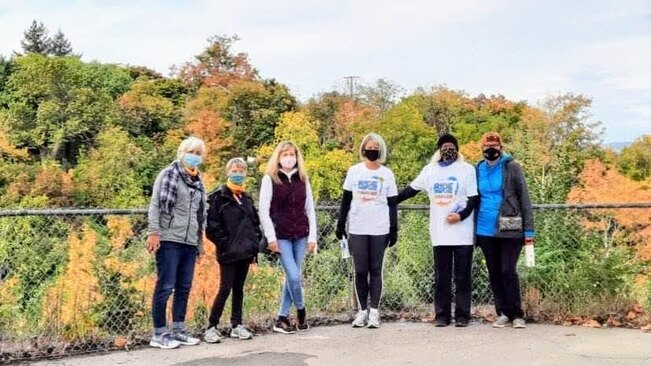 A joking conversation about cleaning bathrooms during the Ride for Refuge was the beginning of Darlene’s journey as a companion with Open Homes Hamilton. “We were walking in the Ride for Refuge last year and my friend Mary* was saying what a pain it is to clean four bathrooms. Well, we were walking with Katie [a member of the Open Homes leadership team], who had just been telling us about home hosting for refugee claimants. So I said, ‘You could host! And I’ll be a companion.’” The spur of the moment idea soon turned into a reality: a group of friends from a Meeting House home church attended a volunteer orientation, submitted their police checks and paperwork, and waited for a call that there was a refugee claimant who was a good fit for Mary’s home. Now, almost a year later, they’re not only gearing up for another Ride--they’re also actively supporting a young refugee claimant from Ethiopia named Abel*. Mary is the host, and the other members of the group are companions: volunteers who accompany newly arrived refugee claimants and offer friendship and support with everyday settlement needs like bus orientation, job searches, and community connections. Open Homes Hamilton is a Hamilton-based program of IAFR Canada. Darlene had been volunteering at the Ride’s Hamilton location for years, and was glad there was a way to continue to participate, even during a pandemic. Teams can do the classic bike or walk, or they can choose from a range of “freestyle” options, from sewing to baking to reading to just about anything you can imagine. “Abel* is a wonderful young man. We’re his 4 mamas--though we try not to mother him too much!” says Darlene. They’ve helped Abel get connected to community beyond his 4 mamas--from volunteering at a street mission every week to connecting with another young man who was supported by Open Homes Hamilton. That connection is proving invaluable, not only for the friendship of someone closer to his own age, but also for the support that he’s received in understanding the refugee hearing process. “When he gets stressed out, I tell him, ‘We’re the warriors, we’ll be praying!’” says Darlene. Last year’s Ride was an opportunity to do something positive in the midst of an overwhelming pandemic, and it led the team down a path they hadn’t imagined--but God had in store for them all the same. This year, they’ve seen up-close the impact of their fundraising power on refugee claimants, and they’re ready and raring to Ride for Refuge again. *Some names changed to protect confidentiality.
0 Comments
Laura Dobrowolski is the Executive Director of IAFR Canada and is looking forward to the day she can reschedule an in-person meeting with the I Live Again Uganda team. 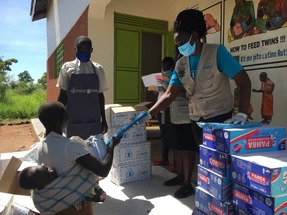 This pandemic has impacted every part of the globe, but its impact in refugee camps has been especially challenging. Our partners at I Live Again Uganda (ILA) have continued to be present and to serve throughout this time. I interviewed them after the first wave, when everyone thought lock-downs were over. We are so very thankful for this partnership and the work they were able to continue doing throughout this tumultuous past year. Q: At the beginning of the pandemic, countries started to close borders amid concerns of the spread of Covid. We flew IAFR staff home on extremely short notice and all our international trips were put on hold. I heard that most NGO’s left Uganda. Since your team is comprised of Ugandans, you were already home. It must have been really hard for your team! Can you tell us what happened in the refugee camp? A: Many NGOs at the refugee settlement had to put a hold on operations. Some of them left. Others changed strategies in their services. It was a stressful and challenging time for NGOs. Q: We know you had lots of challenges, including sickness in your team members and families, and more. What really impressed me about ILA was your ability to adapt. Can you tell me more about your response to the pandemic? A: We gathered our leadership, prayed and considered how we can continue to serve our communities. We had to look at all the protocols and restrictions in place. We became a part of the COVID19 task force right away so that we would be aware of the situation in the communities we serve and provide our programs and services out of knowledge. The need of washing of hands during the pandemic was essential and even mandated. Yet, many of those we serve were unable to purchase soap. We quickly recognized the need to distribute soap and sanitizer. We also provided some phone counseling. We recognized early on that we need to reach the youth. We knew that they were being neglected. We wanted them to be knowledgeable and be safe during the pandemic. 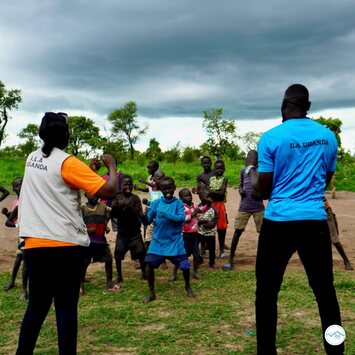 We brought music in to bring awareness and education, to combat COVID19 and restore hope during the lockdowns. Music was a way that we could relate to the youth. The music would reach and get information out regarding pandemic protocols. It also kept us safely distanced and still providing support. The level of teenage pregnancy increased due to the lockdown. Schools were closed. We also did radio talk shows on teenage pregnancy to bring awareness and education to the situation. We really encouraged youth to remain strong and full of hope through our programs. Q: Did Covid spread in the camp? What was the impact of the virus there? A: COVID19 didn’t spread in the refugee settlement. There were less than 10 cases of COVID19 in our settlement. We think the spread was stopped quickly because of restrictions and tracing of infections. The refugee community already understands that they must follow structures and rules. This understanding helped them adjust when restrictions were put in place. Q: Is there anything else you would like to add or comment on how this year has uniquely changed or impacted the work of ILA? A: COVID19 has challenged us to rethink how we can serve in the midst of restrictions and a pandemic. Other NGOs were unable to pivot during this season. We are thankful that we were able to navigate this season and continue to provide much needed services to our communities. June 7th Update: “Last night our President spoke, and we are now back into a 42 day lock-down. Schools closed immediately, travel between districts prohibited, curfews. Please keep us and those we serve in your prayer. Cases have risen and they are doing what they can to stop the spread.” Please pray for the ILA Uganda team and everyone they serve. It was hard to plan with so much uncertainty. Many of our programs were built around gathering in groups and this was not possible due to protocols and restrictions. Alison Witt is an IAFR Canada team member, living in Hamilton, Ontario. Alison leads our Refugee Housing Initiatives and the Church Engagement team.  When I asked Danny, a volunteer with Open Homes Hamilton, why his family chose to invite refugees to live with them, he quickly responded, “because we want our kids to see us live out what we say we believe”. He is not alone. Many Open Homes volunteers are families with young children who believe Jesus is serious when he tells us to practice hospitality. It is easy to see what a vital role children play in creating a community of belonging for newly arrived refugees. However, we only recently realized that while we offer initial orientation and ongoing training for adults volunteering with Open Homes, we don’t actually provide any preparation or education for the children. That got us thinking. Over the past 2 years IAFR Canada’s Church Engagement Team has been working hard at developing training materials for churches. One of the things that gives us great joy is seeing churches discover the unique ways that God might want them to engage with forcibly displaced people. I might be biased, but I think IAFR has created some excellent resources and tools to help churches on this journey. But when I looked at what is in our resource toolbox, I couldn’t find anything suitable for children! They are all created with adults in mind. Another ‘aha’ moment! Stories of refugees are woven throughout the whole Bible, yet they rarely get highlighted in Sunday School classrooms. Wouldn’t it be great for children to hear some of these stories and to learn how deeply God cares about the forcibly displaced? Wouldn’t it be great for them to learn about refugee issues in a way that they could understand? And wouldn’t it be amazing if children in churches all across Canada were motivated and eager to befriend children from refugee backgrounds arriving in our communities? Our Church Engagement Team commissioned a few of us to work at developing some resources specifically for children. We shared these thoughts with Cathy Fairley, one of the best elementary school teachers we know. She was immediately on board with our vision to create a curriculum that churches could use to help children learn about refugees. She also convinced her husband Craig, a graphic designer, to help with the project. We were on a roll! We are delighted to share with you our hot-off-the-press children’s curriculum: Growing Together: helping our children learn about refugees. This series of 4 lessons is designed to be used in the context of a church children’s program- but the lessons but could easily be adapted to use at home with your family, as part of a refugee learning workshop or at a Christian school or day camp. The first lesson was created as a single, ’stand alone’ learning experience that will provide children with a general introduction to basic refugee realities. For a more in-depth study we encourage you to complete the four part series. Throughout the series we use the analogy of a potted plant to help convey the concepts of survival, welcome, and support. A key story from the Bible and a Scripture verse is also a core part of each lesson. Honestly, there are so many fascinating refugee stories in the Bible, it was hard to choose! God brought along a gifted artist, Carolyn Amorin, who created colouring pages and activity sheets to accompany each lesson. You will also find photographs from IAFR partner ministries around the world and a personal message from someone who has had experience living as a refugee in each lesson. We want children to know that refugees are courageous and resilient people with much to offer. It is our prayer and our deep desire that this resource will help children grow in their understanding and respect for people around the world who find themselves in need of refuge. You can download the curriculum HERE. Click here to view a sample page. We would be delighted to share it with you and would love your feedback. Tom Morrison Tom is an IAFR Canada team member, leading our Toronto Newcomer Support project. 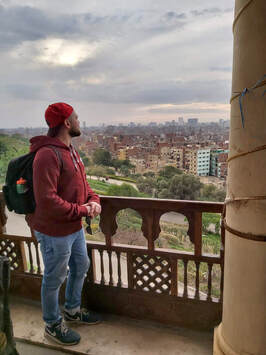 On March 17th, 2020 at 1:00 am I got a call. “This is getting out of hand; you need to come home.” It had been almost eight months since I arrived in Cairo, Egypt to serve for a year. My days were spent at a school for refugee children called African Hope Learning Centre (AHLC). More than ten African countries are represented by about five hundred refugee students and teachers. I came as a member of the IAFR Canada team to support our partner, AHLC, by providing everyday support in the school. All the teachers are also refugees, so there were many days when a teacher could not make it to school. They had to spend up to three days waiting in the Passport and Immigration office to renew their 3-month visa. As African refugees in Egypt, they also did not have accessible health care services, so there were many sick days. I would step in and teach classes on days like these. Other days I was
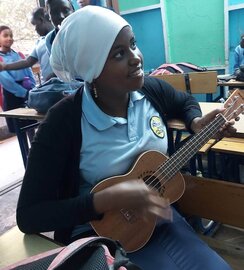 My biggest project while in Cairo was to start the school’s Music Club. Back in Canada, donors to IAFR’s Christmas Project made it possible for me to buy five guitars and five ukuleles for the school. We would have lessons during the break between the morning and afternoon shift of school. About thirty students in total were a part of the music club. Music is an incredible, healing outlet that most of these refugee students had never had an opportunity to explore. For months we had two lessons a week and everyone was loving it and progressing well. I was able to be part of so many amazing things at AHLC, and my absolute favourite was spending some unstructured time with the students. I loved sitting and talking to them during the afternoon break, playing games and being silly at recess, or running into students when I would walk through the souq (market) on weekends. In my eyes, these connections were far beyond anything else I did in Egypt. I was amazed to see how easily these kind, compassionate and intelligent young people welcomed me into their community. I immediately became “Teacher Tom” and never once felt like an outsider. We started talking about their families and how difficult it was to be a black African in Cairo. We talked about dreams of leaving Cairo and resettling in another country. We talked about God and questions they had about the Bible. And, most importantly, we prayed together. The best part is that none of this was done on a one-way street. I was constantly prayed for and blessed by the students. Even with a few very homesick days, things were amazing in Maadi, Cairo. I had my school that I loved, amazing students and teachers, I even had my favourite restaurants and fruit stands in the souq where they knew me by name. Life was good. But then… 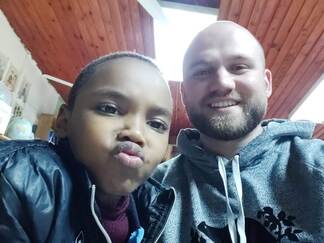 On March 17th at 1:00 am I got a call. “This is getting out of hand, you need to come home.” The COVID 19 pandemic was starting to become a big thing. Entire countries were locking down, borders were closing, airports shutting down. But it was almost unnoticeable in Egypt. Life was still normal. I still went and sat in my favourite cafes drinking coffee, people were out on the streets without a mask in sight, and it was only the day before I got the call to go home that the government had ordered the school to close. I had heard about the virus from people at home and on social media, but I had no idea it was becoming as serious as the world was saying it is. We had a storm which had flooded the school, so it had already been closed for a couple days. The day we finished cleaning was the day the government closed the schools all across the country. This meant it had already been a week since I had seen my students. And then I got the call. On the phone was Rob, my mentor, friend and one of the IAFR Canada directors. He told me that with the uncertainty of the border closures and flight cancellations, I had to get home as quickly as possible. This call was at 1:00 am Cairo time on the 17th. By the end of that phone call I had a flight booked for 8:00 am on the 18th. I immediately started packing. I spent the next day saying goodbye to anyone I could. I had a few friends close by in Maadi and the WhatsApp numbers of some of the teachers at the school. I spent my last day on a mini goodbye tour around Maadi. I said goodbye to my friends at the fruit stands in the souq and at my coffee shops and restaurants. But I never got the chance to say goodbye to my students. With the school unexpectedly already closed for almost a week, I never got to tell them I was leaving. And then I went to the airport. My flight was cancelled. The Egyptian government was closing all airports until further notice. I thought I was going to be stuck in Egypt. I have some very well-connected people in my life who helped me as I panicked. We booked a flight to London, UK and I spent a night there while we found a flight to Toronto. After an incredibly stressful thirty-five hour travel day, I arrived in Toronto on March 19th. My entire life shifted in just 48 hours. I started that 48 hours in one continent and ended it in another. My life circumstance completely changed, and it was totally out of my control. I now have a brand-new appreciation for what refugees experience. To be uprooted with no control. The difference for me is that my life or well-being was never in danger. I was heading home; I knew where I was going to end up. Some refugees have years of limbo. My limbo was one night in a hotel in London, eating fish and chips. I completely understand that my experience was a tiny fraction of what they experience, what it’s like to be uprooted the way a forcibly displaced person is. My year back in Canada has been very good. I got engaged, became a stepfather, started a new family and got involved in some amazing ministries in Toronto. There has been much to bring me joy during this time where many find it hard to find joy in the isolation and lock-downs. God has been so good to me. As amazing as it has been since I got home, there is still something that feels incomplete and that is my relationships with my students. From the beginning of my time in Cairo, I knew my time at AHLC was temporary; my return flight was booked for June 20th. But I never got to say goodbye. A handful of students have tracked me down on social media and we exchange messages every now and then, but there still hasn't been the closure needed for relationships like this. It remains incomplete. I wait somewhat impatiently for the day that I can fly there and hear them call me “Teacher Tom” again, to properly say goodbye to these students that I love dearly. One Last Thought: During my time with AHLC, quite a few people said things like, “You’re going to change those kid’s lives.” or, “They’re so lucky to have you over there.” This made me uncomfortable. I was just another guy going to help at the school. I was a temporary fixture, and I knew that from day one. The truth is that my relationship with these students changed my life. 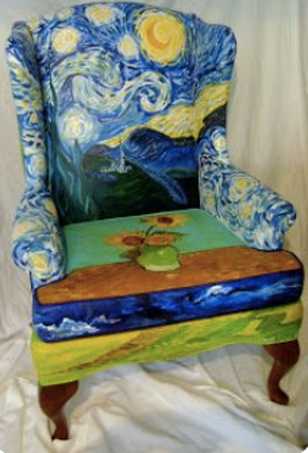 For many years, IAFR Canada team member Insaf Safou has visited Iraq, where she has shared God’s love and practical support with people who have experienced forced displacement. Insaf originally came from Iraq. Her family’s story includes a time living as refugees in Turkey, before finally arriving in Canada. Wherever Insaf has happened to live, and whatever her circumstances at any point in her life, God has always used her to bring hope and help to her neighbours – both next door and around the world. IAFR is currently working in Iraq by supporting a sewing project for refugee women. Hopeful Hands is a social enterprise that Insaf started alongside a local church in Erbil. This program provides sewing machines, patterns, materials, oversight and instruction for women, in order for them to create beautiful and practical items that are sold to pay for the program and for their salaries. Hopeful Hands has provided critically needed income and community for more than 100 displaced women during the last few years. IAFR is excited to be working with our partners in Beirut to expand this initiative into Lebanon. The initial plan was for Insaf to visit Beirut during 2020 to lay the foundation of the Lebanon sewing program alongside a team from the Beirut Nazarene Church. However, as is the case with so many initiatives and in so many lives, the realities of COVID-19 restrictions have set in. These realities, in combination with the economic and social adversities that have befallen Beirut during the last year, have resulted in the visit and the program being delayed. During a recent zoom meeting, as an icebreaker, participants were shown a number of photos and asked to choose the one that described how they felt at that particular moment in time. Insaf’s choice was a comfortable looking easy chair, which happened to be painted like Van Gogh’s famous Starry Night. It is a chair that invites both rest and dreams. As Insaf herself describes, “The chair is me in my home for the last year… eating, hot water, food, family… I’m sitting on my beautiful, colourful chair now – my comfort zone – the best place for everyone right now. But my heart is not satisfied. I want to leave my comfort zone and run to the people.” Insaf’s heart remains among the people to whom God called her. In that same exercise, participants were asked to choose a second picture that represented where they wish they could be, or the reality they hoped for themselves. This time Insaf chose a slightly ominous, though beautiful photo of a long dark road leading into the unknown. “I want to be on the road.” Insaf says. As Insaf waits for both the practical and political necessities, as well as God’s “yes” in her heart to go to Lebanon and help start the sewing project, she remains focused on the ministry to which she is called. Part of this ministry is an Arabic-speaking Bible Study she organizes: I started a mission group called Heart for Middle East. We meet every week on Zoom. There are deep-in-Spirit, mature missionaries from Iraq, Lebanon, and Turkey in the group, people I met when I was there. We share updates and needs and pray for each other. A Bible teacher from Northern Ireland provides some teaching once a month. We are disconnected in body, but in spirit we are one and well connected. Thank God for Zoom and the internet. When I asked them to pray so I could go on mission, one of them replied, ‘Don’t underestimate what you are doing right now. It is impacting our lives. You are feeding us.’ Please pray for our partner churches in Iraq and Lebanon who are helping forcibly displaced people. Pray for the sewing social-enterprise program that is active in Iraq, but still waiting to begin in Lebanon. Pray for God’s timing for Insaf to join with the church in Lebanon to help initiate this program, and as always, to share God’s love and presence with those she meets. The COVID-19 restrictions have slowed or permanently stopped many important initiatives around the world, including some projects of IAFR Canada. Pray for both those on the ground and those who work for helping organizations, that during this time we would be able to receive and experience the deep peace and profound realities expressed in Psalm 46:10, the particular verse God gave Insaf a year ago… “Be still and know that I am God.” 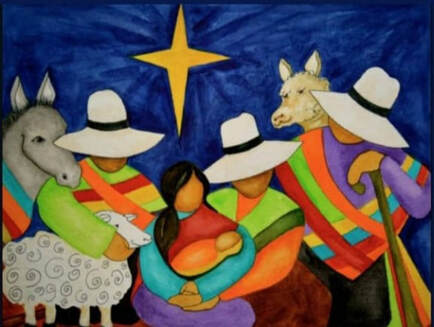 "Peruvian Nativity- God With Us" Marcia Carole "Peruvian Nativity- God With Us" Marcia Carole Joy to the World! Be silent for a moment and consider: What is the good news? What is good news to displaced people? To an asylum-seeker? To someone in a refugee camp? To someone awaiting resettlement? To someone longing for truth and reconciliation? What is good news to you? Here is the really good news: We are neither hopeless nor helpless as we face the refugee situation in the world, nor any of the trials and troubles that assail us. Christ has come, and he is still present in our midst! And whether we do big things or small things, if we do them faithfully and with the love of Christ, they have eternal significance. Jesus is with us. Here is a brief story of one house in Canada that is continuing to bring the joy of God into the world: The Peoples House opened its doors to refugees in January 2016. The majority of residents are refugee claimants. These asylum seekers receive care and support at the house during their first few months in Canada. This home is a ministry of The Peoples Church in Toronto, and was created with the support of IAFR Canada, in response to the question of how the church could best respond to the refugee crisis that is facing our country and our world. Thousands of refugees are fleeing their homes due to danger and persecution. They come from all around the world and seek a safe home and a new beginning in Canada. The Peoples House has responded to this need by providing a safe home for approximately 8-14 refugees at a time who would otherwise have no safe place in Toronto. The Peoples House is a beautiful expression of God’s love for his children. And it is not the only one! Across Canada, and around the world, Churches and faith groups and communities and individuals are responding to the refugee crisis with love and joy. Let us live up to our identity as carriers of hope, makers of peace, distributors of love, and singers of joy! Read: Luke 2:13-14 Pray: Sing “Joy to the World” as a defiant hymn of praise, of victory of light against darkness, of hope against despair. 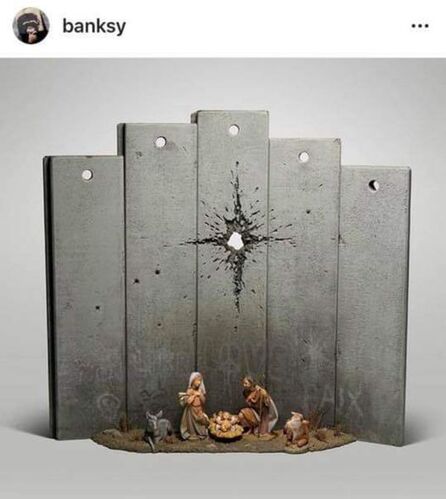 The Scar of Bethlehem The Scar of Bethlehem Is there hope? Be silent for a moment and consider: What do you do when you feel overwhelmed? Where do you find hope when things seem hopeless? This Advent prayer series has highlighted incredibly disturbing facts and realities about the refugee situation in our world, from the vast number of displaced people to the tiny fraction of refugees being resettled; the millions of newly displaced people that are expected in the next year; the danger to women and children on the move; the poverty of the nations that are hosting most of the world’s refugees; and the generational displacement of Indigenous people in places like Canada. Where is the hope? The book of Revelation is not one that is normally used for Christmas. It describes a world that has gone so far wrong it seems beyond redemption, with the overwhelming forces of Empire, violence and greed pitted against vulnerable communities of Jesus-followers. In spite of this, the message of Revelation is one of hope against despair. Remain faithful, the book says, persevere, and you will see the mountains brought low and the valleys raised up. It is the fulfillment of Mary’s Magnificat. This is particularly appropriate because in Revelation 12 we see the Nativity from a supernatural point of view. John describes the events of Jesus’ birth through the poetic and apocalyptic imagery of an enormous red Dragon and a pregnant woman clothed with the sun. When the child Jesus is born, the Dragon (the Accuser, the ancient serpent) waits to devour him the moment he is born. But the child and the woman are snatched up to safety. The Dragon is frustrated, and ultimately expelled from heaven, which brings both joy and woe. Joy, because it has been defeated in heaven, and will no longer accuse humanity before the throne. Woe, because its expulsion brings it to earth, filled with fury, where it will wage war on the followers of Christ and the creation of God through deception. But there is more joy than woe, because the ultimate defeat of the Dragon will come by the blood of the Lamb and the testimonies of the saints. Even the created order frustrates the Dragon as the earth swallows up the waters the Dragon spews forth. The Dragon’s defeat is assured. It cannot devour the child, it cannot destroy the woman, and it cannot deceive or overcome the woman’s other offspring, who are the Church, the saints of God. But the battle is still fierce, and the defeat of the Dragon involves the martyrdom of the saints who are obedient unto death just like their saviour and king. Christmas is often thought of as a time of comfort and joy, but it must also be remembered as a time of invasion, danger, flight, warfare, death, martyrdom, kingdoms crumbling, the announcement of a new king. As we pay attention to the woes of this world and the seemingly impossible situation facing millions of refugees, let us remember that we all still have reason to hope. In the end, the Dragon is defeated. Read: Revelation 12:1-17 Pray: Sing “O Little Town of Bethlehem”, paying special attention to the line, “The hopes and fears of all the years are met in thee tonight.” 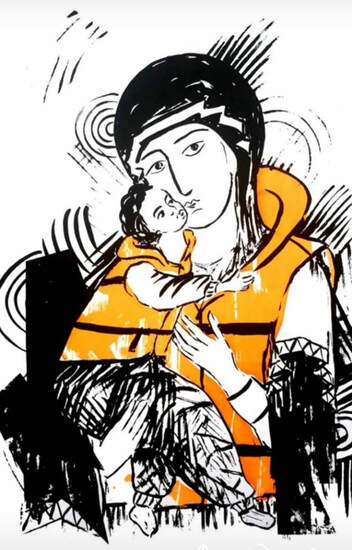 “We call upon the federal government, in collaboration with the national Aboriginal organizations, to revise the information kit for newcomers to Canada and its citizenship test to reflect a more inclusive history of the diverse Aboriginal peoples of Canada, including information about the Treaties and the history of residential schools.” Be silent for a moment and consider: How would you feel if the history of your people, which included incredibly hardship and resiliency, was misrepresented or entirely ignored in your nation’s history books? The above is the 93rd of 94 “Calls to Action” detailed in the Truth and Reconciliation Commission Report for Canada. The report examines the historic abuses suffered by Canada’s First Nations at the hands of settlers, governments, social agencies and Churches. It also details the resiliency of the First Nations peoples, and the ongoing legal implications of the Treaties that were signed between the Nations and Canada. The 94 calls to action include but are not limited to: formal apologies from the nation and Church denominations; child welfare; health; language and culture; spirituality; education; the justice system; missing children and burial information. What we see in this report is the devastating legacy of the forced displacement of Indigenous People in Canada, a policy and practice that began with first contact, went through the Residential School system, includes the “Sixties Scoop” of children from their families, and continues today in systemic and structural racism. The First Nations of North America have been internally displaced people for generations, a fact that is only now being officially recognised in some places. Canada has failed to honour its elders, failed to listen to and respect the people who were here first, the people who offered the deepest and costliest hospitality to the European settlers. The TRC’s 93rd call is for an honest and inclusive history of Canada to be taught to newcomers, including refugees. If we do not tell the truth about the past, there can be no hope for moving forward. Read: Luke 2:22-38; Revelation 7:9-12. Pray: Start reading through the 94 Calls to Action and pray for each one. This will take some time -days or weeks - but it is worth our time. Ask what role you have in seeing these calls acted upon, and if there is any change that is needed in your own heart. 94 Calls to Action : (As of November 2018, only 10 of the calls have been completed, 19 are in progress, 32 have projects proposed, and 33 have not been started.) 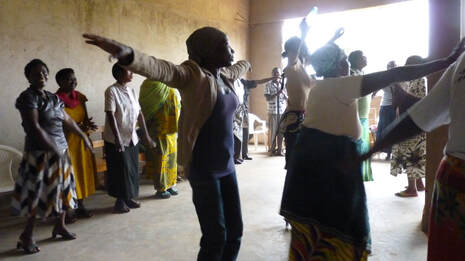 Worshiping with Forcibly Displaced Women in Nairobi Worshiping with Forcibly Displaced Women in Nairobi International Association for Refugees (IAFR) works with 160 Churches that live and minister in the Kakuma Refugee Camp in Kenya. Be silent for a moment and consider: What does a typical “Church” look like, in your experience? How might Church be different in a refugee camp? How might it be the same? It is both wonderful and humbling to find God in unexpected places. It is wonderful because God is working all over the world, and no walls, governments, social situations, economic conditions or wars can keep God out. It is humbling because of course God is there, and why would we think it was unexpected in the first place? That has a lot more to do with our expectations and cultural assumptions than it does with the power of the Gospel. Many Christian groups have the idea that they should plant Churches, and of course this can be a very good thing to do. But check first. Are there already Churches ministering and serving where you want to plant? Do they need you, or even want you to come in and start something new? Or is it better to partner and support the ministry that is already happening? The Nativity story includes many “unlikely” characters, not the least of which are the shepherds in Luke 2 and the Magi in Matthew 2. One group are local agrarian workers, the other are foreign intellectuals. They were both “unlikely” groups (in the world’s view) to be visited by a host of angels, or to be guided by a star, and to show up at the birth of the Messiah. Why would God choose them of all people as witnesses? Well, why should it surprise us that he does? Both groups attend the mother and baby at different times, and afterwards the shepherds announce the good news of the birth to anyone who would listen. They are the first evangelists. And the Magi presumably share what they have seen when they return home as well. Refugees come from every background, from hard-working farmers to well-educated intellectuals, and everything in between. Many of them are Jesus-followers who carry a missionary heart with them wherever they go. When IAFR went to Kakuma they wisely partnered with the Churches already worshiping, serving and living within the camp. The Churches they are working with represent only a portion of those that are ministering there. What’s more, these Churches are now planting new ministries outside of the camp, because the Gospel cannot be stopped. God is on the move, and it should not surprise us that he is working in and through the Kakuma Refugee camp. Read: Luke 2:8-20 Pray: Ask God to uncover your false expectations and assumptions about what he can or cannot do in the world, and to replace them with awe and wonder at his plan, his love, and his power. Thank God for the Churches being run by refugees all around the world, and the way the Gospel is advancing in the midst of the crisis of mass human displacement. These are the countries that are producing the most displaced people (Refugees, IDP, and Asylum Seekers): 1. Syria (13.5 million) 2. Colombia (8.2 million) 3. DR Congo (8.1 million) 4. Afghanistan (5.5 million) 5. Venezuela (4.5 million) 6. South Sudan (4.3 million) 7. Yemen (3.8 million) 8. Somalia (3.6 million) 9. Ethiopia (3.2 million) 10. Sudan (2.7 million) *Note that there are also 5.4m Palestinian refugees in the Middle East for which the UN reports separately. *Source Be silent for a moment and consider: How do you define family? Here is another list of countries that we in the West have been taught almost nothing about, except that we should fear them. The words that come to mind for many when they encounter this list are: chaos, poverty, terrorism, and enemy. Whole cultures, people groups, families and individuals are reduced to the sum of our ignorant fears. We define them as first and foremost separate from us, not a part of us. Once again, we should remember that people do not leave their homes and everything they know on a whim. The people who are fleeing their homes are doing so because there is a genuine and credible threat to their safety and their family’s safety, and they are looking for a place to be where they can be safe. But even more, we must remember that these are our brothers and sisters. Their past, present and future is inextricably bound up with ours. Luke reminds us of this in the second genealogy we come across in the Gospels. Where Matthew’s genealogy of Jesus begins with Abraham, Luke is a little more ambitious and takes us all the way back to Adam, and in fact to God. Jesus is shown here to be the Saviour of all humankind, and we are confronted with the fact that we all share a common heritage. Jesus incarnated, lived, taught, was persecuted, died, and was resurrected for all of humanity, not just certain parts of it. It makes no sense, therefore, to believe that the countries on the above list are not part of us, and that we are not part of them. They are our brothers and sisters. All of us are caught up in the same family line with Jesus. Do we dare come to God with the ancient question: “Am I my brother’s/sister’s keeper?” Read: Luke 3:23-38 Pray: Pray for your family. Start with your immediate family, then start moving outwards to your extended family and your Church family. Then start going further and further out. Ask God to help you see those who are fleeing violence and terror in the above countries as brothers and sisters as well. Ask God what it means, on a global scale, to be our brother’s and sister’s keeper. |
WELCOME!
Our vision is to help people survive and recover from forced displacement. We do this together with the church, both globally, and locally in Canada. Archives
January 2024
Categories |
ABOUT IAFR.CA |
OPPORTUNITIES |
AFFILIATES
|
CONTACTIAFR Canada
374 Sheppard Ave E Toronto, ON M2N 3B6 info@iafr.ca Please Note: IAFR Canada does not sponsor people to resettle in Canada. You may want to contact one of Canada's sponsorship agreement holders. |
|
*IAFR Canada is a distinct organization from IAFR USA
All photos on this website are by IAFR unless otherwise noted |
© 2020 International Association For Refugees Canada

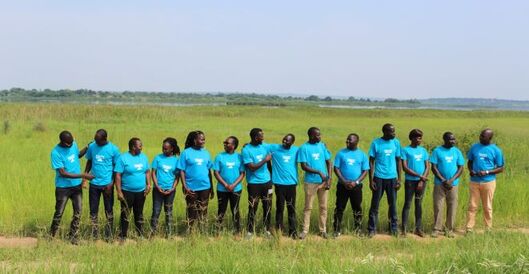

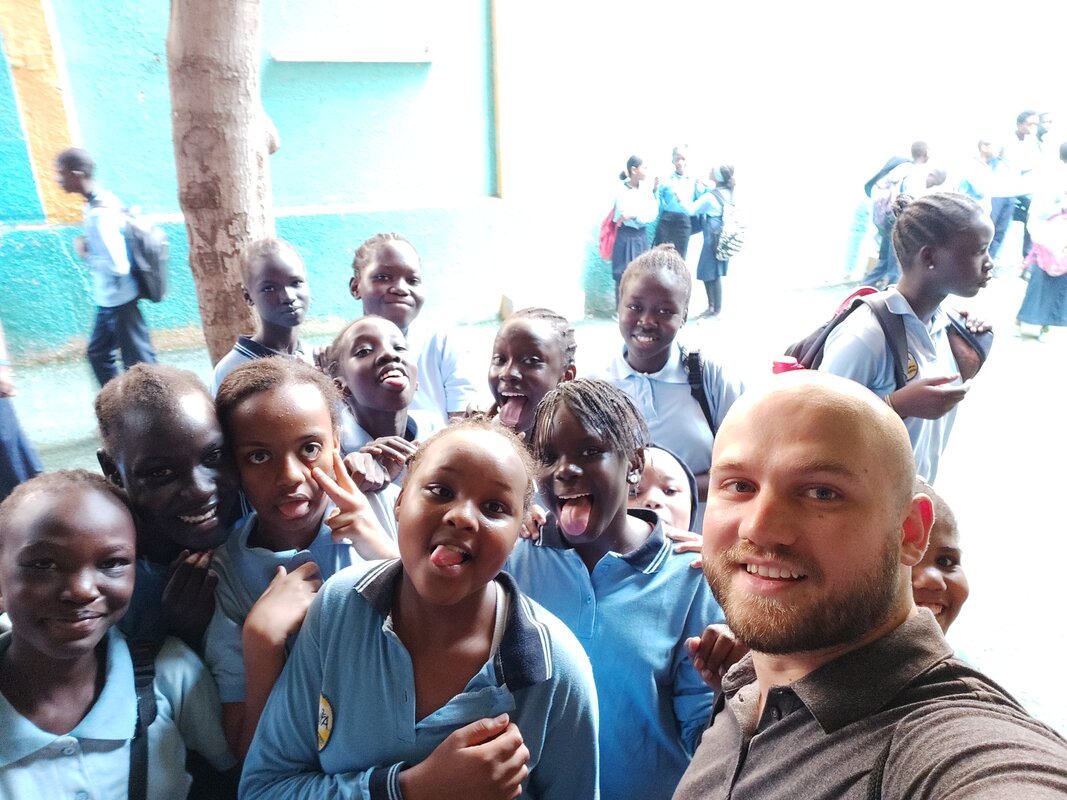
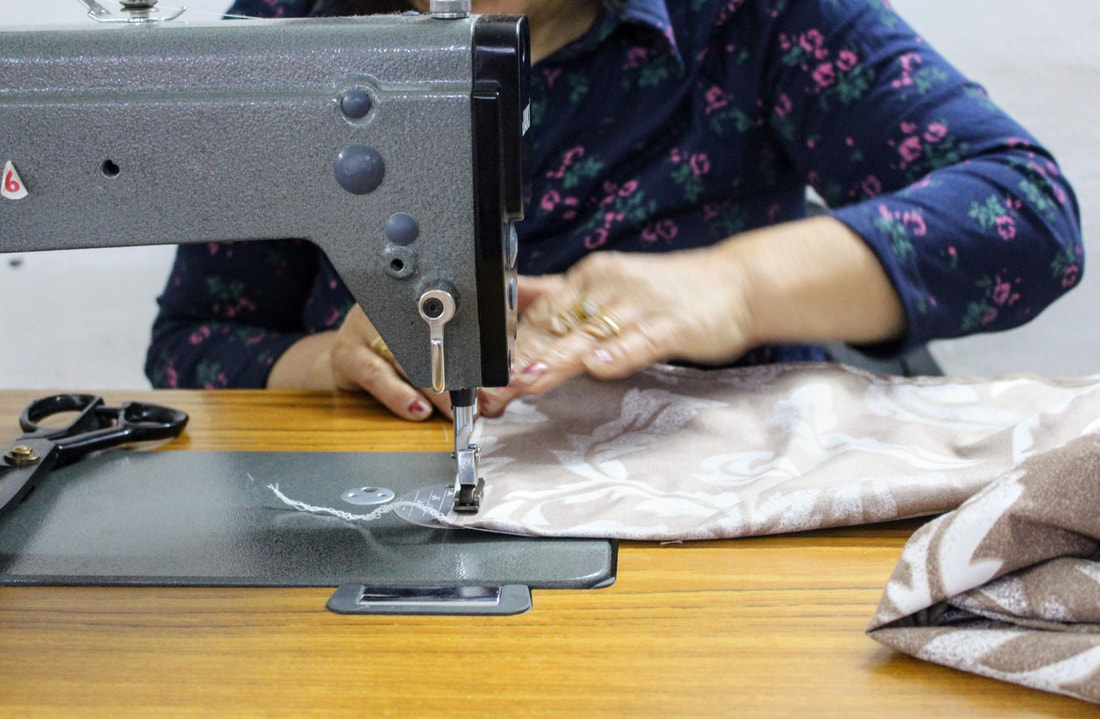
 RSS Feed
RSS Feed